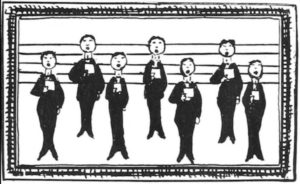 We need a richer idea of consciousness and of our minds: Jenny Judge suggests that our experience of music in particular points to a need for an expanded conception of the mind to include visceral apprehension. Many who have championed the idea of an extended mind that isn’t just identifiable with the brain alone will be nodding along, perhaps rhythmically.
We need a richer idea of consciousness and of our minds: Jenny Judge suggests that our experience of music in particular points to a need for an expanded conception of the mind to include visceral apprehension. Many who have championed the idea of an extended mind that isn’t just identifiable with the brain alone will be nodding along, perhaps rhythmically.
For those of us who are a little entrenched in the limited idea of the mind as a matter of the brain doing computations on representations, Judge cunningly offers a couple of pieces of bait in the form of solid cognitive insights her wider perspective can yield. One is that we perceive and respond to rhythm in important ways, even without perceiving it at times. The timing of our utterances can actually change the way they are interpreted and carry significant information. A delay in giving assent can qualify the level of agreement, and apparently this is even culturally variable; the Japanese expect a snappy response, while in Denmark you can take your time without the risk of seeming grudging.
A second insight concerns entrainment, the tendency of connected vibrating systems to synchronise rhythm. Judge presents plausible evidence that a form of entrainment plays an important role in governing the activity of our minds and even of the neurons in the brain (so it ought not to be ignored, even by those who are initially happy with a narrower conception of cognition.
Judge discusses the challenges in perceiving music, with its complexity and its inherent sequentiality. The way we perceive time and motion is complex (we could add that sometimes the visual system just seems to label some things as ‘moving’ even though they are not perceived as changing place). But, wisely I think, she does not quite make the further case that the phenomenology of musical experience is peculiarly intractable. It’s true that great music can cause us to experience emotional and cognitive states that we could never otherwise explore, and it would certainly be possible to base an argument of incredulity on this. Just as Leibniz professed disbelief about the possibility of a mill-type mechanism, however complex, producing awareness, or Brentano declared that intentionality was something else altogether, we could claim that musical experience just is not the kind of thing that physical processes could create. Such arguments are powerfully persuasive, but without some further explanation as to exactly why consciousness cannot arise from physical processing, they don’t prove anything.
It would be hard to disagree, however, with the suggestion that our phenomenological experience really needs to be properly charted in a way that dies justice to its complexity. I’d have a go myself if I had any idea of how to set about it.

Brian Eno teamed up with neuroscientist Mendel Kaelen to create an app for therapeutic music – and it ended up expanding both their minds:
https://www.rollingstone.com/culture/news/wavepaths-app-guides-users-through-therapeutic-trips-w511245
Pingback: The Potential Of Attention – Utne Reader | We Seek the Truth!
Pingback: The Potential Of Attention – Utne Reader | mystery stream
what is interesting is why music even exists, it seems far more than the mere regular noises of other species.
might it be that it music is a fluke with no actual evolutionary cause ? I’m sure the evolutionary biologists could dream up a standard unfalsifiable claim, as if their forte